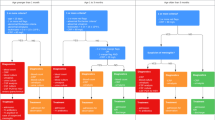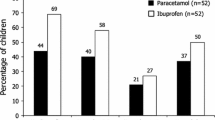Summary
Background: The evaluation of a young child (1-36 months of age) with fever without apparent source (fws: body temperature =38,0 °C and no apparent source found after history taking and physical examination) is often a diagnostic and therapeutic dilemma, despite published guidelines. Data on management of children with fws in daily Dutch pediatric practice are not available.
Aim: To characterize the management of children with fws in paediatric practice and to compare this with published Dutch and American practice guidelines.
Methods: In a self-administered questionnaire four case scenarios of non-toxic-appearing children (2, 10, 10 and 20 months of age) with fws were described. For each case, paediatricians were asked to select which diagnostic and therapeutic strategy they would perform. The results were compared to the published Dutch and American guidelines.
Results: The response rate was 81%. The variability in both the diagnostic and therapeutic strategies was large. The compliance with the guidelines varied for diagnostics from 16% to 74% and for therapy (irrespective of laboratory test results) from 36% to 69%. In the case scenarios of the younger child and the more ill-appearing child with normal laboratory findings, the respondents more often selected the option to hospitalize the patient then suggested in the guidelines.
Conclusion: There is a large variability in the management of children with FWS in the paediatric emergency medicine. The compliance with guidelines varies strongly, depending on the age and the risk profile of the case scenario. Attention for implementation of guidelines will enlarge the compliance.
Samenvatting
Achtergrond: De evaluatie van het jonge kind (1 tot 36 maanden oud) met koorts zonder focus (lichaamstemperatuur =38,0 °C, zonder duidelijk focus op basis van anamnese en/of lichamelijk onderzoek) is vaak een diagnostisch en therapeutisch dilemma, ondanks gepubliceerde richtlijnen. Van het handelen bij kinderen met koorts zonder focus in de dagelijkse praktijk door kinderartsen in Nederland zijn geen gegevens.
Doel: Het beleid bij jonge kinderen met koorts zonder focus in de acute kindergeneeskundige praktijk inventariseren en vergelijken met de gepubliceerde Nederlandse en Amerikaanse beleidsadviezen.
Methode: In een enquête werden vier casussen beschreven van niet-toxisch zieke kinderen (2, 10, 10 en 20 maanden oud) met koorts zonder focus. Kinderartsen werd gevraagd aan te geven welke diagnostische en behandelstrategie zij per casus zouden volgen. De resultaten werden vergeleken met gepubliceerde Nederlandse en Amerikaanse adviezen.
Resultaten: De respons was 81%. De variabiliteit in zowel de diagnostische strategieën als de behandelopties was groot. De variatie in het aantal respondenten dat volgens de richtlijnen diagnostiek uitvoerde en behandelde (ongeacht de laboratoriumbevindingen), was respectievelijk 16% tot 74% en 36% tot 69%. Er werd vaker dan aanbevolen gekozen voor ziekenhuisopname bij de casus van het jonge en het zieker ogend kind met normale laboratoriumbevindingen.
Conclusie: Er is een grote variabiliteit in het beleid bij jonge kinderen met koorts zonder focus in de acute kindergeneeskunde. De compliantie met richtlijnen varieert sterk, afhankelijk van de leeftijd en het risicoprofiel van de casus. Aandacht voor implementatie van richtlijnen zal de compliantie vergroten.

Similar content being viewed by others
Literatuur
Bouwhuis CB, Kromhout MM, Twijnstra MJ, et al. Geringe etnische verschillen in spoedeisende problemen bij kinderen: 10 jaar acute hulp in het Sophia Kinderziekenhuis te Rotterdam. Ned Tijdschr Geneeskd. 2001;145:1847-51.
Baraff LJ, Bass JW, Fleisher GR, et al. Practice guideline for the management of infants and children 0 to 36 months of age with fever without source. Pediatrics. 1993;92:1-12.
Baraff LJ. Management of fever without source in infants and children. Ann Emerg Med. 2000;36:602-14.
Bleeker SE, Moll HA. Het jonge kind met koorts zonder focus in het ‘post-Haemophilus influenzae-tijdperk’. Ned Tijdschr Geneeskd. 2002;146:3-5.
Bachur RG, Harper MB. Predictive model for serious bacterial infections among infants younger than 3 months of age. Pediatrics. 2001;108:311-6.
Bleeker SE, Moons KGM, Derksen-Lubsen G, et al. Predicting serious bacterial infection in young children with fever without apparent source. Acta Paediatr. 2001;90:1226-32.
Kuppermann N, Fleisher GR, Jaffe DM. Predictors of occult pneumococcal bacteremia in young febrile children. Ann Emerg Med. 1998;31:679-87.
Hsiao AL, Baker MD. Fever in the new millennium: a review of recent studies of markers of serious bacterial infection in febrile children. Curr Opin Pediatr. 2005;17:56-61.
Belfer RA, Gittelman MA, Muniz AE. Management of febrile infants and children by pediatric emergency medicine and emergency medicine: comparison with practice guidelines. Pediatr Emerg Care. 2001;17:83-7.
Young PC. The management of febrile infants by primary-care pediatricians in Utah: comparison with published practice guidelines. Pediatrics. 1995;95:623-7.
Zerr D, Del Beccaro M, Cummings P. Predictors of physician compliance with a published guideline on management of febrile infants. Pediatr Infect Dis J. 1999;18:232-8.
Oostenbrink R, Groot R de, Moll HA. Het jonge kind met koorts zonder focus; diagnostiek en beleid. Ned Tijdschr Geneeskd. 1999;143:185-90.
Kwaliteitsbureau. Conceptverslag van de ICT-enquête. Nederlandse Vereniging voor Kindergeneeskunde, januari 2001.
Lomas J, Anderson GM, Domnick-Pierre K, et al. Do practice guidelines guide practice? The effect of a consensus statement on the practice of physicians. N Engl J Med. 1989;321:1306-11.
Kramer MS, Etezadi-Amoli J, Ciampi A, et al. Parents' versus physicians' values for clinical outcomes in young febrile children. Pediatrics. 1994;93:697-702.
Kuppermann N. The evaluation of young febrile children for occult bacteremia: time to reevaluate our approach? Arch Pediatr Adolesc Med. 2002;156:855-7.
Cincinnati Children's Hospital Medical Center. Evidence based clinical practice guideline for fever of uncertain source in children 2 to 36 months of age. Cincinnati: Cincinnati Children's Hospital Medical Center, 2003. www.guideline.gov
Brook I. Unexplained fever in young children: how to manage severe bacterial infection. BMJ. 2003;327:1094-7.
Author information
Authors and Affiliations
Corresponding author
Additional information
Mw. dr. S.E. Bleeker, mw. drs. J.T.E. de Penning, mw. dr. H.A. Moll, afdeling Algemene Kindergeneeskunde, Erasmus mc-Sophia, Rotterdam.Correspondentieadres: Dr. H.A. Moll, afdeling Algemene Kindergeneeskunde, Erasmus mc-Sophia, Postbus 2060, 3000 CB Rotterdam, tel: 010-4636196, fax: 010-4636685
Rights and permissions
About this article
Cite this article
Bleeker, S.E., de Penning, J.T.E. & Moll, H.A. Het beleid bij kinderen met koorts zonder focus; een enquête onder kinderartsen. KIND 75, 64–69 (2007). https://doi.org/10.1007/BF03061663
Issue Date:
DOI: https://doi.org/10.1007/BF03061663




